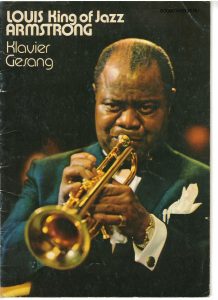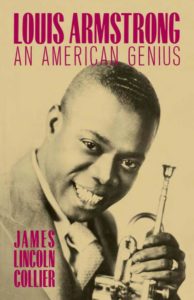Browse in the Library:
- Louis Armstrong “Hotter Than That” – The Top 25 pearls in Jazz history
- To understand jazz, everything starts with Louis Armstrong.
- Download Louis Armstrong sheet music transcription from our Library.
Louis Armstrong “Hotter Than That” – The Top 25 pearls in Jazz history
To understand jazz, everything starts with Louis Armstrong.
The first great soloist in jazz, born in New Orleans, he brought wonderful rhythmic freedom and melodic invention to what had been a rather stilted ragtimey style of music. His great recordings with his Hot Five and Hot Seven from 1920s Chicago form a magnificent body of work and this track has everything – Louis’ virtuoso cornet, his wordless “Scat” singing and a fabulous improvised duet with guitarist Lonnie Johnson.

Born in abject poverty in New Orleans, Armstrong became the first great soloist in jazz, and the musician who was the single most powerful influence on the music during its first half century. Abandoned by his father, he was brought up by his mother and grandmother in some of the poorest areas of his home town, and he apparently never know his real birth date, preferring to adopt Independence Day 1900 as his birthday. As a boy, he worked on a coal cart for the Jewish Karnofsky family, working in the Red Light District of New Orleans and developing a musical talent that grew further during his time in the Colored Waifs home, where he spent some of his teenage years. he played cornet in the Waifs’ band, and by his late teens had acquired a reputation as a fine brass player with plenty of ideas and natural stamina.
His big break came when he was summoned to Chicago in 1922 to join King Oliver’s band, with whom he made his first records. His reputation grew when he travelled to New York in 1924 to become a star soloist with Fletcher Henderson.
Back in Chicago, he made a remarkable series of discs with a studio band known as his Hot Five and Hot Seven, in which he developed his bravura solo style, and launched the concept of the improvising jazz soloist. His brilliant, inventive playing became a symbol of the energy and freedom of the ‘jazz age’ – the riotous pre-Depression America of the Roaring Twenties. By the end of the 1920s, having moved to New York in 1929 to perform in the revue Hot Chocolates, Armstrong became a major star. As a singer, trumpeter and entertainer, he fronted his own big band throughout the 1930s and well into the 1940s, making a string of influential discs that featured his high, powerful trumpeting and his gravelly singing.
He toured to Europe in 1933-4 , leading a big band of local musicians. In 1947 he scaled down to a small group – the All Stars – which he led for the rest of his life, playing an up-to-date brand of the Dixieland jazz of his home town. He also appeared in numerous films, and made several popular vocal records, including Hello Dolly and What a Wonderful World, which introduced him to a vast audience unaware of his musical innovations in the 1920s. When he died he was universally regarded as the father figure of jazz, and loved by the people he had met and encouraged all over the world as ‘Ambassador Satch’, playing a relentless series of tours and concerts well into his old age.
Download Louis Armstrong sheet music transcription from our Library.
The influence of Armstrong on the development of jazz is virtually immeasurable. His irrepressible personality both as a performer and as a public figure was so strong that to some it sometimes overshadowed his contributions as a musician and singer.
As a virtuoso trumpet player, Armstrong had a unique tone and an extraordinary talent for melodic improvisation. Through his playing, the trumpet emerged as a solo instrument in jazz and is used widely today. Additionally, jazz itself was transformed from a collectively improvised folk music to a soloist’s serious art form largely through his influence. He was a masterful accompanist and ensemble player in addition to his extraordinary skills as a soloist. With his innovations, he raised the bar musically for all who came after him.
Though Armstrong is widely recognized as a pioneer of scat singing, Ethel Waters precedes his scatting on record in the 1930s according to Gary Giddins and others. Billie Holiday and Frank Sinatra are just two singers who were greatly indebted to him. Holiday said that she always wanted Bessie Smith’s ‘big’ sound and Armstrong’s feeling in her singing. Even special musicians like Duke Ellington have praised Armstrong through strong testimonials. Duke Ellington, DownBeat magazine in 1971, said, “If anybody was a master, it was Louis Armstrong. He was and will continue to be the embodiment of jazz.” In 1950, Bing Crosby, the most successful vocalist of the first half of the 20th century, said, “He is the beginning and the end of music in America.”

